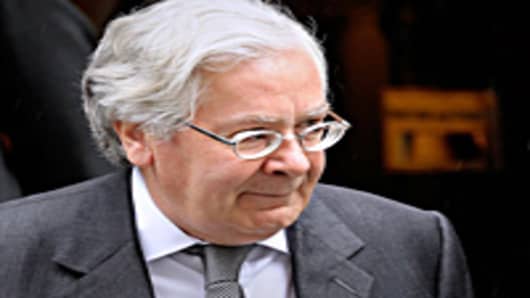The Bank of England is on the verge of approving another round of monetary stimulus, with Governor Mervyn King supporting an extra 50 billion pounds ($78.5 biillion) of gilt purchases, minutes to its June 6-7 policy meeting showed on Wednesday.
The BoE's Monetary Policy Committee voted 5-4 against restarting the gilt purchases they suspended in June, with King, and external members Adam Posen and David Miles all voting for a 50 billion pound rise.
BoE executive director for markets Paul Fisher supported a 25 billion pound increase.
The minutes show far stronger explicit support for more QE than many economists had expected, and is the first 5-4 split on the MPC since June 2007.
King was last in a minority in August 2009, when he also supported more QE than the majority.
Last month BoE policymaker David Miles was the only official to call for an expansion of quantitative easing, but economists had generally expected him to be joined by only one or two further members of the MPC this month.
Moreover, it looks likely that there could be a majority for more QE as soon as next month.
"Most members judged that some further economic stimulus was either warranted immediately or would probably become warranted in order to meet the inflation target," the minutes said.
All members of the MPC believed that inflation was likely to be lower than the central bank forecast in May, when it predicted it would take until the second half of next year before inflation fell below its 2 percent target.
Data published on Tuesday showed that inflation fell unexpectedly to a 2-1/2 year low of 2.8 percent, further easing the way for the BoE to expand QE - possibly as soon as next month.
The BoE decided in May not to extend QE purchases largely because inflation was proving slower to fall than expected.
MPC members cited a fall in commodity prices and signs of less generous wage settlements as evidence of weaker inflation in the short term, and warned that risks to Britain from the euro zone debt crisis had intensified.
"The likelihood of a disorderly outcome looked to have increased, and that could, if it crystallised, have a significant effect on global demand and the stability of the banking system," the minutes said.
Some MPC members had said they wanted to see the outcomes of Greek and French elections before deciding on more QE.
Some also said that instruments other than gilt purchases may be more appropriate to stimulate the economy.
Last week the BoE and the government announced new liquidity measures and lending guarantees to support credit.
BoE Governor Mervyn King said in a speech last week that the economic outlook had darkened under a "black cloud" of worries about the euro zone debt crisis, and that the case for further QE had increased.


